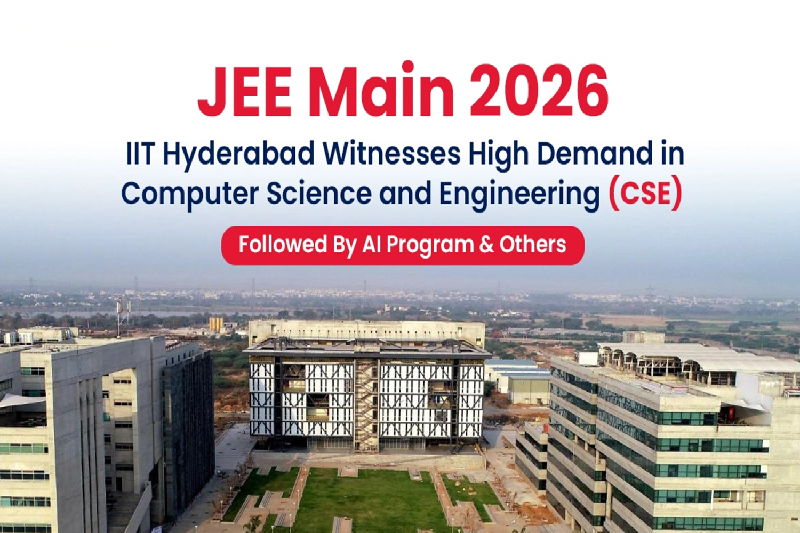
IIT Mandi BTech Trends 2026: AI-Data Science Debuts Strong, CSE Remains Top Choice
IIT Mandi continues to emerge as a preferred destination for undergraduate engineering aspirants, reflecting both the institution’s growing reputation and the shifting interests of India’s next-generation engineers. The recently released Joint Implementation Committee (JIC) 2025 report reveals notable trends in candidate preferences for BTech programs, including rising demand for core engineering disciplines and a strong debut performance by the newly launched BTech in Data Science and Artificial Intelligence (AI–DS).
Computer Science & Engineering Maintains Top Spot
Unsurprisingly, Computer Science and Engineering (CSE) continues to dominate student preferences at IIT Mandi. The 2025 data shows CSE receiving 19,202 candidate choices, up from 16,569 in 2024 and 14,724 in 2023. This represents a 15.89% increase from last year, following a 12.53% rise in 2024. The sustained growth underscores the enduring popularity of computing-related disciplines, driven by increasing industry demand for software systems, AI expertise, and data analytics professionals.
AI–Data Science Makes a Strong Debut
The most eye-catching development in 2025 is the launch of the BTech in Data Science and Artificial Intelligence, which drew 15,951 candidate choices in its first year—making it the second-most preferred branch at IIT Mandi. This remarkable debut highlights a clear shift toward data-centric, machine learning, and AI-driven technologies, reflecting aspirants’ growing interest in cutting-edge domains.
It is worth noting that the older BTech in Data Science and Engineering, which had attracted 12,676 choices in 2024 and 10,717 in 2023, has been discontinued this year. The new AI–Data Science program effectively consolidates and upgrades the institute’s offerings in data-oriented engineering fields.
Core Engineering Branches Continue to Shine
While emerging fields are gaining traction, traditional branches remain robust choices among students. Electrical Engineering (EE), for instance, recorded 14,892 choices in 2025, up from 13,139 in 2024 and 11,674 in 2023. This corresponds to a 13.34% increase from last year, illustrating the sustained relevance of electrical systems in modern engineering applications.
Similarly, Mechanical Engineering showed consistent growth, rising from 11,810 choices in 2024 to 13,486 in 2025, after climbing from 10,090 in 2023. This represents a 14.19% year-on-year increase, confirming that mechanical disciplines continue to attract students despite the surge in tech-driven streams.
Interdisciplinary and Specialized Programs on the Rise
IIT Mandi’s specialized and interdisciplinary courses also witnessed notable growth. Mathematics and Computing surged from 11,139 in 2024 to 13,040 in 2025, reflecting a 17.07% rise following a 26.12% jump in 2024. This trend indicates increasing student interest in fields that combine theoretical foundations with practical computational applications.
Microelectronics & VLSI emerged as another fast-growing discipline, climbing from 9,090 in 2024 to 11,078 in 2025—a 21.87% increase. This growth is in line with India’s expanding semiconductor and chip-design ecosystem, emphasizing the strategic relevance of microelectronics expertise.
Core Sciences and Materials Engineering Hold Strong
Traditional science and materials-focused disciplines continued to show strong performance. Materials Science and Engineering grew from 6,892 choices in 2024 to 8,015 in 2025, a 16.29% increase, while Engineering Physics increased from 7,284 to 8,185, marking a 12.37% rise.
Similarly, Bioengineering maintained steady growth, advancing from 6,195 in 2024 to 7,043 in 2025 (13.69% increase), highlighting the growing interest in biotech applications. Chemical Sciences (BS program) also showed strong momentum, increasing from 4,692 in 2024 to 5,420 in 2025, a 15.52% rise, reflecting a balanced blend of foundational science and applied engineering appeal.
Civil Engineering and General Engineering Trends
Among infrastructure-oriented programs, Civil Engineering grew from 9,761 choices in 2024 to 11,254 in 2025, a 15.29% increase. Meanwhile, the General Engineering program, offering a flexible pathway to multiple specializations, rose from 6,417 to 7,077, a 10.28% increase. These trends show that while aspirants are excited by tech-driven streams, there is continued interest in programs offering broader engineering exposure and core infrastructure skills.
Analysis of Overall Trends
The 2025 JIC report for IIT Mandi highlights a healthy balance between traditional and emerging streams. On the one hand, computing-centric courses like CSE, Mathematics and Computing, and AI–Data Science dominate aspirant choices, reflecting India’s growing tech-oriented job market. On the other hand, Mechanical, Electrical, Materials, and Civil Engineering continue to attract students, underlining the enduring importance of foundational engineering disciplines.
Several insights emerge from the data:
- Students are increasingly seeking data-centric, AI-driven programs, evidenced by the remarkable debut of AI–Data Science.
- Traditional engineering branches continue to grow steadily, ensuring IIT Mandi maintains a diverse and balanced academic ecosystem.
- Specialized and interdisciplinary programs like Microelectronics, VLSI, and Bioengineering are capturing student interest in emerging technology sectors.
- Growth across nearly all branches indicates rising demand for high-quality undergraduate engineering education in India, with IIT Mandi benefiting from a strong reputation and modern infrastructure.
Conclusion
IIT Mandi’s 2026 BTech trends highlight both the evolution of engineering education and the shifting aspirations of India’s engineering aspirants. The strong debut of BTech in Data Science and Artificial Intelligence, alongside continued dominance of CSE and robust growth in core branches, reflects a dynamic interplay of emerging technologies and foundational engineering disciplines.
As the engineering landscape evolves, IIT Mandi remains a compelling choice for students seeking a blend of innovation, interdisciplinary learning, and traditional engineering expertise. With sustained interest across diverse programs, the institute is well-positioned to nurture the next generation of engineers ready to tackle challenges in AI, computing, electronics, materials, and beyond.



